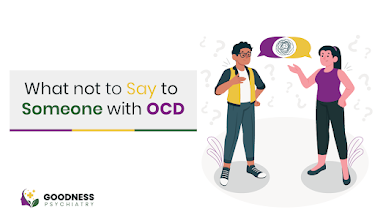What are the 7 common symptoms of OCD and eating disorders?
Obsessive-Compulsive Disorder (OCD) and eating disorders
often intersect in complex ways. Many people suffering from OCD may also
experience eating disorders, leading to overlapping symptoms and behaviors that
can be challenging to understand. At Goodness Psychiatry LLC, we
are committed to helping you recognize the signs and seek appropriate
treatment.
In this blog, we will explore 7
common signs of OCD and eating disorders, focusing on the specific
connections between these two conditions. Whether you are wondering about are
OCD and eating disorders related, or questioning if can OCD cause eating
disorders, we will cover the essential details to help you gain a better
understanding.
1. Compulsive Behaviors Around Food
One of the most notable signs of OCD in individuals with
eating disorders is compulsive disorder eating. People with this pattern
may engage in repetitive behaviors surrounding food, such as rigid meal
rituals, excessive counting of calories, or washing hands repeatedly before
eating. This type of compulsive behavior is often tied to a fear of contamination
or needing to "correct" an action, a common characteristic of OCD.
For example, some individuals may experience contamination
OCD with food, where they fear germs, chemicals, or even the food itself.
They might spend excessive time preparing their meals to ensure safety,
avoiding certain foods altogether, or restricting their intake.
2. Unrealistic Body Image and Perfectionism
Individuals with both OCD and eating disorders often
experience intense body image concerns. For those dealing with anorexia and
OCD or bulimia and OCD, this often manifests as an obsessive desire
to control one’s weight and shape. Anorexia OCD may involve constant
weight checking, comparing body size to idealized images, and a constant
obsession with "being thinner."
On the other hand, bulimia OCD may include recurring
thoughts about eating, purging, or restricting food, combined with rituals
around food consumption and weight monitoring. These behaviors stem from the
need for control, which is a hallmark of common symptoms of OCD.
3. Extreme Fear of Gaining Weight
Many people with eating disorders have an extreme fear of
gaining weight, which can become obsessive. This fear is often linked with are
eating disorders OCD. In cases like ARFID and OCD, individuals may
have a specific anxiety about certain foods, textures, or the fear that food
might be “unsafe” to eat. ARFID vs OCD highlights that while both
conditions involve food-related issues, the underlying motivations can differ. ARFID
(Avoidant/Restrictive Food Intake Disorder) is more about the avoidance of
food due to sensory aversions or past trauma, while OCD typically involves
intrusive thoughts and compulsive behaviors about food.
4. Ritualistic Eating Patterns
In both anorexia ocd and bulimia ocd, there
can be ritualistic eating patterns that serve as a way to manage anxiety or
intrusive thoughts. This can include specific routines around when and how much
to eat, or engaging in rituals like cutting food into small pieces or arranging
it in a particular order. These behaviors may offer a temporary sense of
control, but they can also reinforce the compulsive nature of both OCD and
eating disorders.
5. Obsessive Thoughts About Food and Eating
Obsessive thoughts about food, weight, and body image are
common in both OCD and eating disorders. Someone suffering from common signs
of OCD might experience intrusive thoughts such as, “I must eat this or I
will gain weight,” or “If I eat this, something bad will happen.” These
thoughts are often irrational, but they can feel very real to the individual,
leading them to engage in avoidance behaviors or restrictive eating.
6. Emotional Distress and Anxiety
Individuals with both OCD and eating disorders often
struggle with high levels of anxiety and emotional distress. In cases like can
OCD cause eating disorders, the anxiety of dealing with obsessive thoughts
about food can lead to behaviors like compulsive disorder eating or
restrictive eating. For instance, someone might experience intense anxiety
around meals, leading them to avoid eating altogether or overeat, which can
worsen the cycle of obsessive thoughts and compulsive actions.
7. Difficulty Seeking Help
For individuals with common traits of OCD and eating
disorders, seeking help can be difficult. The need for control and
perfectionism often interferes with the willingness to accept help or
acknowledge the severity of the condition. Whether it’s diet OCD yang benar
dan efektif (correct and effective dieting with OCD) or professional
therapy, people with these co-occurring conditions may resist interventions due
to their obsessions about food and self-image.
Conclusion: Understanding the Connection Between OCD and
Eating Disorders
If you're wondering whether can OCD lead to eating
disorders, it's important to note that both conditions can feed into each
other. Common signs of OCD like intrusive thoughts and compulsions
around cleanliness or perfection can easily translate into restrictive eating
behaviors or fears about food. Similarly, the anxiety and distorted thinking
patterns present in anorexia ocd or bulimia ocd can become
pervasive, leading to more severe eating disorders over time.
If you or someone you know is experiencing common OCD
symptoms, or struggling with an eating disorder like anorexia or bulimia,
seeking professional help is crucial. At Goodness Psychiatry LLC, we
provide specialized treatment for individuals with OCD and eating disorders,
helping them address both the mental and physical aspects of their struggles.
Remember, OCD and eating disorders are related, and
with proper support, recovery is possible.
For more information or to schedule a consultation, visit us
at Goodness
Psychiatry LLC.
.jpg)

Comments
Post a Comment